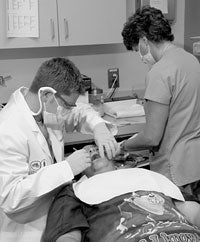ECU looks to expand dental residency program
GREENVILLE, N.C. (Sept. 5, 2002) — To lessen the shortage of dentists in eastern North Carolina, the Brody School of Medicine at East Carolina University has requested expansion of its dental residency program.
“We’re not sure if we’ll be able to proceed with our expansion plan until the Legislature approves this year’s budget,” said Dr. Phyllis Horns, former interim vice chancellor for health sciences. Horns was at the helm of the Health Sciences Division this past year when the University of North Carolina Board of Governors studied whether to establish a dental school at ECU.

ECU dental resident Michael Fleitz and dental assistant Karen Holt work on patient Bill Layton in the Eastern Carolina Family Practice Center. If funding comes through, ECU’s dental residency program could more than double. Photo by Cliff Hollis.
“After looking at all of the aspects and costs involved with establishing a full dentistry school, the Board of Governors recommended expansion of our dental residency training program,” Horns said. The study commission estimated a price tag of $100 million to establish a dental school at ECU.
The residency expansion proposal, submitted in July, requests growing the dental residency training program from three to seven residents the first year and adding two full-time faculty members, two dental hygienists and four dental assistants. ECU has requested $555,000 to fund the first year of the expansion, which would be fiscal year 2003-2004.
State funding would be necessary to help offset the expanded operating costs. The number of slots available in each medical residency is limited under Medicare graduate medical education reimbursement formulas; thus, Medicare would not fund new residency positions. The medical school”s residency programs are currently supported financially by Pitt County Memorial Hospital.
“The Brody School of Medicine and the hospital have a strong history of working together to meet the health care needs of the people of eastern North Carolina,” said Diane Poole, chief planning officer for University Health Systems of Eastern Carolina. “The funding aspects of the dental expansion program have yet to be identified and at this time are contingent on the General Assembly”s provision of state funds.”
The ECU program, which began in 1979, operates four dentistry chairs in the Eastern Carolina Family Practice Center using three dental residents and a half-time faculty member. The residents see an average of 15 to 20 patients monthly in the FPC and approximately 20 patients monthly in the PCMH emergency department. The residents, who serve for one year at ECU, are on-call 24 hours a day, seven days a week. Providing service to E.D. patients is an integral part of the residents” training.
“We frequently have patients show up in the E.D. with abscesses, chipped teeth or gum infections that need antibiotics or minor treatment by a dentist,” said Dr. Nicholas Benson, chairman of the ECU Department of Emergency Medicine. “The residency program provides much-needed access to dental services for these patients. It also provides the emergency department with the support we need for our patients who present with a wide variety of health-related dental problems.”
The expansion would also establish an eight-chair, off-site dental residency clinic. “The study commission”s long-term recommendation is to expand the program to 20 to 25 residents,” Horns said. “In the second year we would like add a pediatric dentistry option through support from the School of Dentistry at UNC-Chapel Hill. We know there is a huge public need in eastern North Carolina, actually throughout the state, to increase access to dental care services. Many of the patients who don”t have access to dental services are those who can least afford dental care.”
Nationally, North Carolina ranks 47th in the nation in dentists per capita, according to the ECU Center for Health Services Research and Development. In analyzing the state”s dental workforce, the center found eastern North Carolina lags even farther behind. In 1999, there were 2,808 dentists in the state, or one for every 2,735 people,